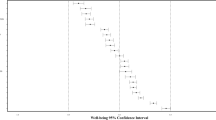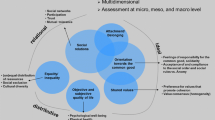Abstract
Do modern accounts of well-being which have influenced, or been adopted by, some economists encourage excessive ‘individualism’? I suggest that this question can be answered by considering two objections to modern views of welfare: (1) that they involve an impoverished view of persons and (2) that they decompose all goods into goods for individuals and do not give intrinsic value to collective goods. I argue that two influential views of well-being—the informed desire view and the capability approach—can convincingly respond to these objections. Both views allow for our distinct social roles and identities: the ways in which social norms and institutions shape values and a concern for others. Neither view sees goods as goods only of specific individuals, nor do they require us to separate out neatly the realisation of values in the lives of various individuals. But that does not imply that goods such as friendship are collective rather than individual goods or that collective goods have intrinsic value. Nonetheless, accounts of well-being may need to be more explicit than they have been in incorporating the social dimension.
Similar content being viewed by others
References
Arneson R (1999) Human flourishing versus desire satisfaction. In: Paul E, Miller F, Paul J (eds) Human flourishing. Cambridge University Press, Cambridge
Arrow K (1994) Methodological individualism and social knowledge. Am Econ Rev (Papers Proc) 84(2):1–9
Brännmark J (2006) Leading a life of one’s own: on well-being and narrative autonomy. R Inst Philos Suppl 59:65–82
Burchardt T (2004) Capabilities and disability: the capabilities framework and the social model of disability. Disabil Soc 19(7):735–751
De Herdt T (2008) Social policy and the ability to appear in public without shame: some lessons from a food relief programme in Kinshasa. In: Comim F, Qizilbash M, Alkire S (eds) The capability approach: concepts, measures and applications. Cambridge University Press, Cambridge
Deneulin S (2008) Beyond individual freedom and agency: structures of living together in the capability approach. In: Comim F, Qizilbash M, Alkire S (eds) The capability approach: concepts, measures and applications. Cambridge University Press, Cambridge
Foster J, Handy C (2009) External capabilities. In: Basu K, Kanbur R (eds) Arguments for a better world: essays in honor of Amartya Sen. Volume I: ethics, welfare and measurement. Oxford University Press, Oxford
Frey B, Stutzer A (2002) Happiness and economics: how the economy and institutions affect human well-being. Princeton University Press, Princeton
Frey B, Stutzer A (2012) The use of happiness research for public policy. Soc Choice Welf 38:659–674
Gore C (1997) Irreducibly social goods and the informational basis of Amartya Sen’s capability approach. J Int Dev 9(2):235–250
Griffin J (1986) Well-being: its meaning, measurement and moral importance. Clarendon Press, Oxford
Griffin J (1991) Against the taste model. In: Elster J, Roemer J (eds) Interpersonal comparisons of well-being cambridge. Cambridge University Press, UK
Griffin J (1996) Value judgement: improving our ethical beliefs. Clarendon Press, Oxford
Griffin J (2008) On human rights. Oxford University Press, Oxford
Harsanyi J (1981) Morality and the theory of rational behavior. In: Sen AK, Williams BAO (eds) Utilitarianism and beyond. Cambridge University Press, Cambridge
Ibrahim S (2006) From individual to collective capabilities: the capability approach as a conceptual framework for self-help. J Human Dev 7(3):397–416
Layard R (2005) Happiness: lessons from a new science. Penguin, London
MacIntyre A (1981) After virtue: a study in moral theory. Duckworth, London
Mill JS (1962) Utilitarianism. In: On liberty and essay on Bentham and selection of writings of Jeremy Bentham and John Austin J. Warnock (ed). Fontana Press, Glasgow
Nussbaum M (1988) Nature, function and capability: Aristotle on political distribution. Oxford studies in ancient philosophy (6) (supplementary vol), pp 145–184
Nussbaum M (2000) Women and human development. Cambridge University Press, Cambridge
Nussbaum M (2006) Frontiers of justice: disability, nationality, species membership. Belpknap Press of Harvard University Press, Cambridge
Nussbaum M (2011) Creating capabilities. Cambridge University Press, Cambridge
Parfit D (1984) Reasons and persons. Oxford University Press, Oxford
Qizilbash M (2006) Well-being, adaptation and human limitations. R Inst Philos Suppl 59:83–109
Qizilbash M (2011) Disability and human development. In: Kaldor M, Vizard P (eds) Arguing about the world: the work and legacy of Meghnad Desai. Bloomsbury Academic Press, London
Raz J (1986) The morality of freedom. Oxford University Press, Oxford
Robeyns I (2008) Sen’s capability approach and feminist concerns. In: Comim F, Qizilbash M, Alkire S (eds) The capability approach: concepts, measures and applications. Cambridge University Press, Cambridge
Sen A (1979) Utilitarianism and welfarism. J Philos LXXVI:463–489
Sen A (1980) Equality of what? In: McMurrin S (ed) The Tanner lectures on human values. University of Utah Press, Salt Lake City
Sen A (1985) Well-being, agency and freedom: the Dewey lectures 1984. J Philos LXXXII:169–221
Sen A (1992) Inequality re-examined. Clarendon Press, Oxford
Sen A (1993) Capability and well-being. In: Nussbaum M, Sen A (eds) The Quality of Life. Oxford University Press, Oxford
Sen A (1999) Development as freedom. Oxford University Press, Oxford
Sen A (2004) Why we should save the spotted owl. London Rev Books 26(3):10–11
Sen A (2006a) Identity and violence: the illusion of destiny. Allen Lane, London
Sen A (2006b) What do we want from a theory of justice? J Philos 103:215–238
Sen A (2009) The idea of justice. Allen Lane, London
Sen A, Williams B (1982) Introduction: utilitarianism and beyond. In: Sen A, Williams B (eds) Introduction: utilitarianism and beyond. Oxford University Press, Oxford
Sumner W (1996) Welfare happiness and ethics. Oxford University Press, Oxford
Taylor C (1990) Irreducibly social goods. In: Brennan G, Walsh C (eds) Rationality, individualism and public policy. Australian National University, Canberra
Terzi L (2005a) Beyond the dilemma of difference: the capability approach to disability and special education needs. J Philos Educ 39(3):443–459
Terzi L (2005b) A capability perspective on impairment, disability and special needs: towards social justice in education. Theory Res Educ 3(2):197–223
Author information
Authors and Affiliations
Corresponding author
Rights and permissions
About this article
Cite this article
Qizilbash, M. Are modern philosophical accounts of well-being excessively ‘individualistic’?. Int Rev Econ 61, 173–189 (2014). https://doi.org/10.1007/s12232-014-0204-x
Received:
Accepted:
Published:
Issue Date:
DOI: https://doi.org/10.1007/s12232-014-0204-x




